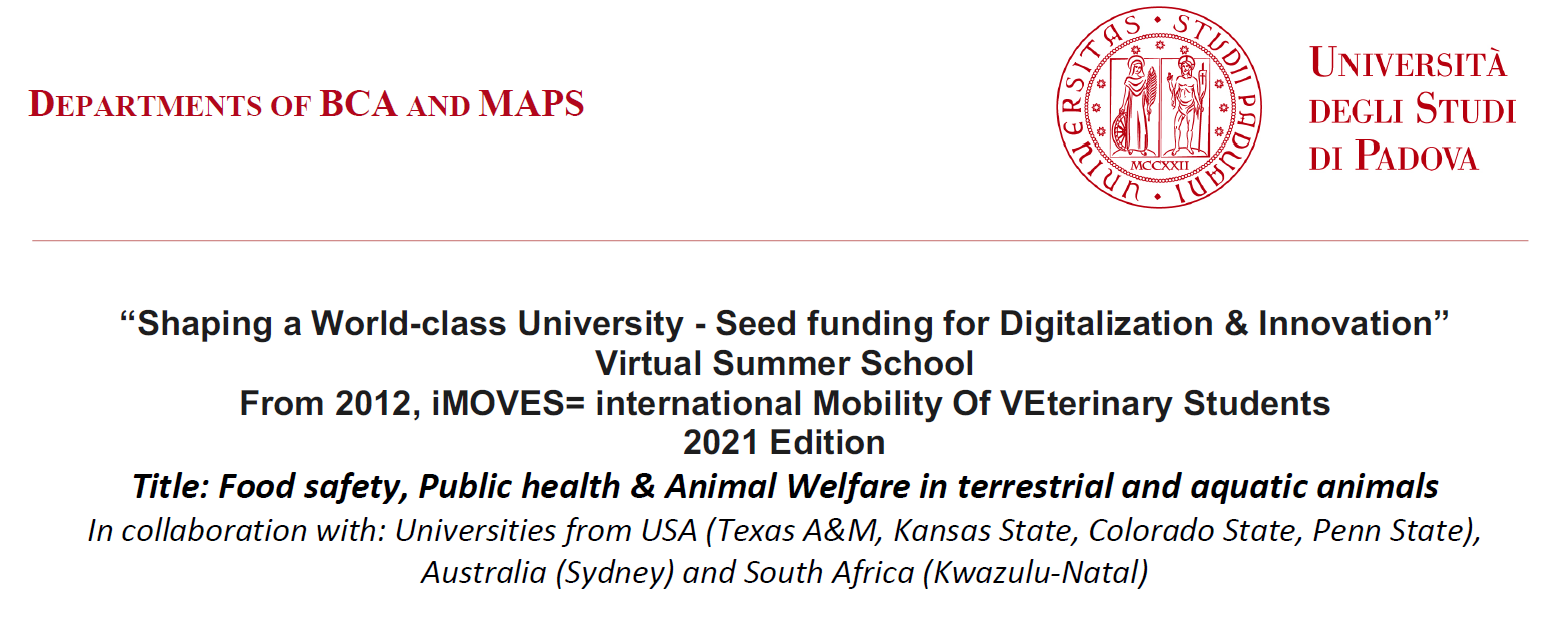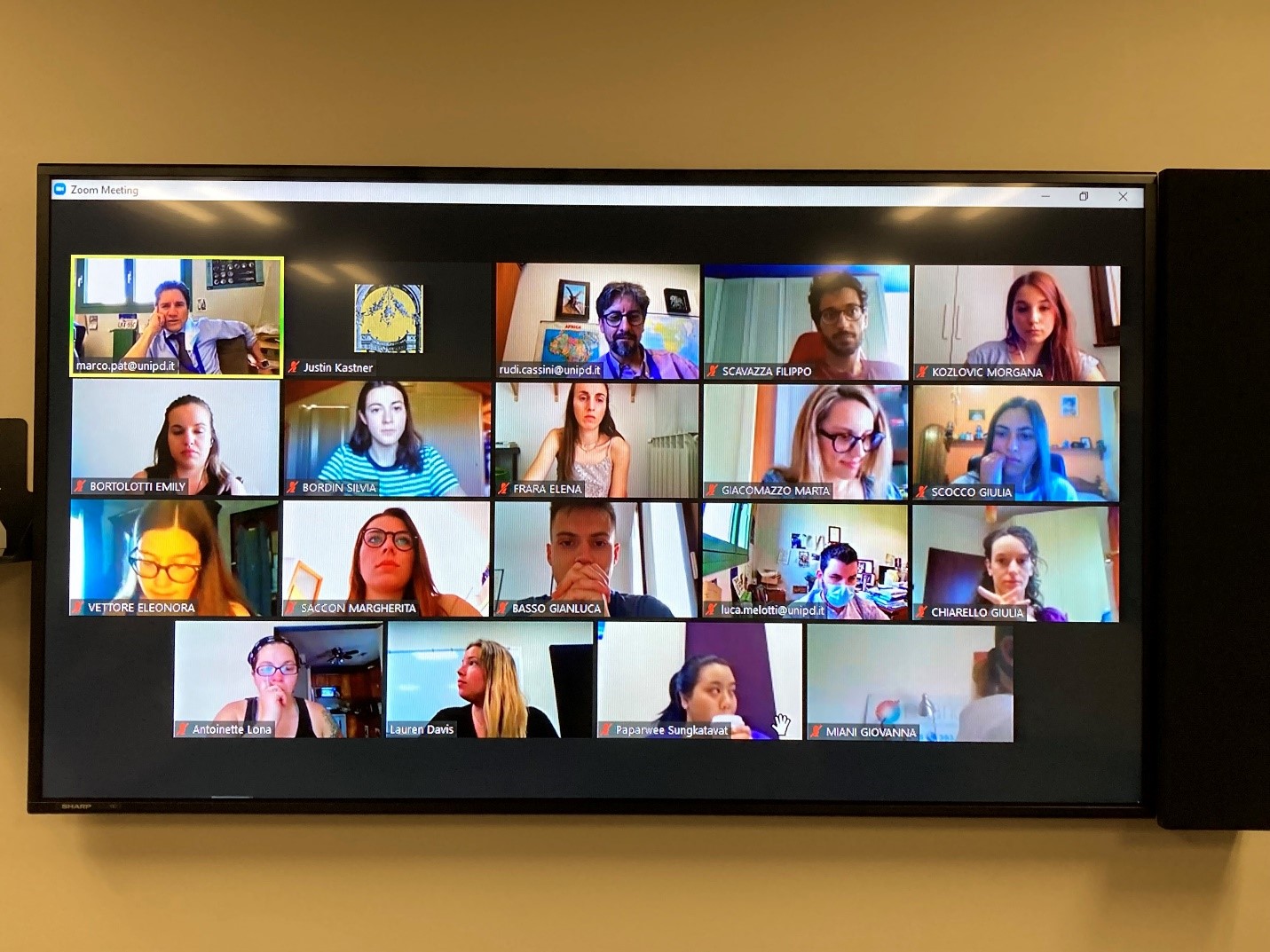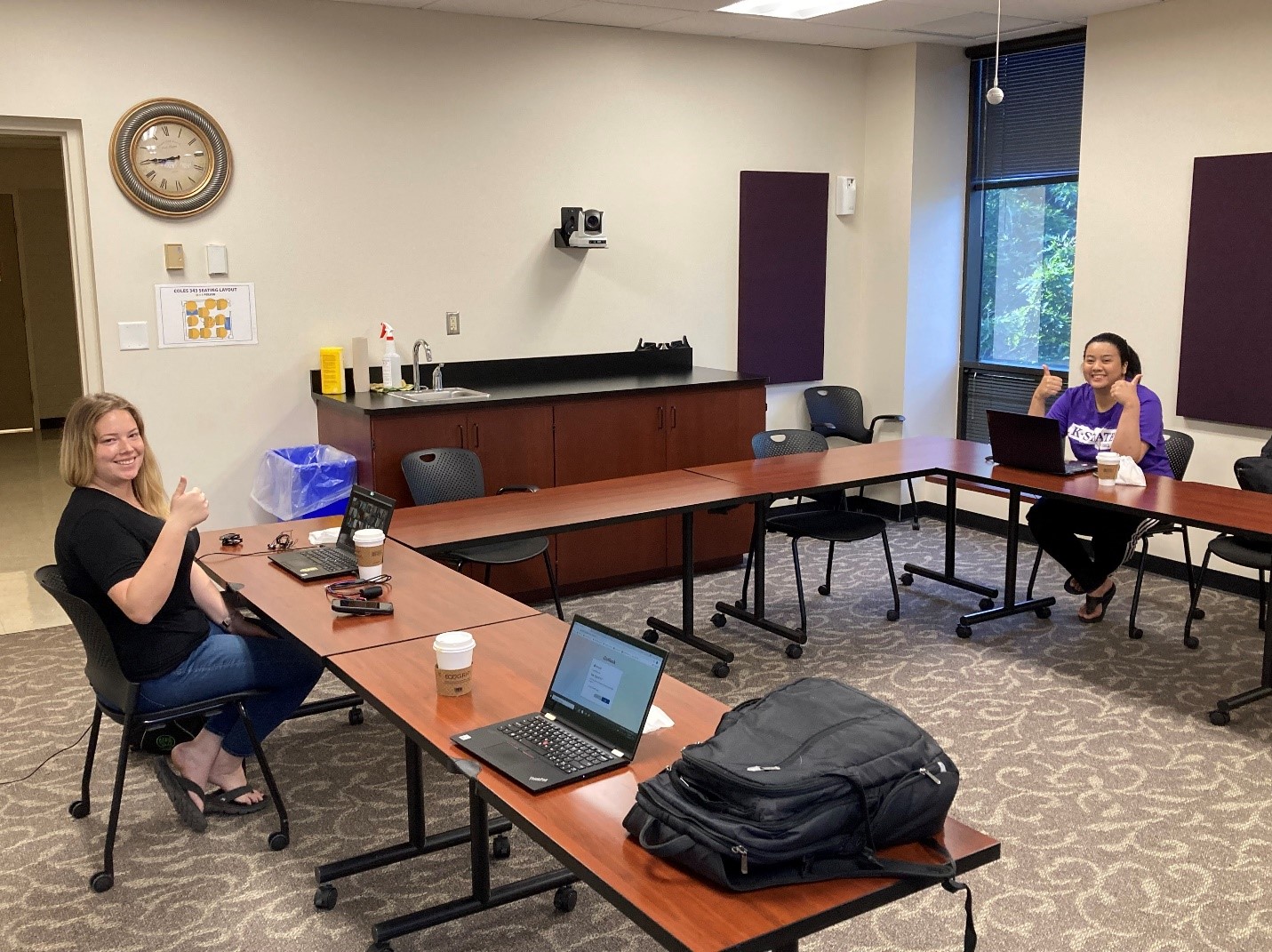One Health Newsletter
iMOVES Summer 2021 Course: Food Safety, Public Health and Animal Welfare in Terrestrial and Aquatic Animals
Authors
Antoinette Lona, MS
August 2021 graduate, MS program
Veterinary Biomedical Sciences
Kansas State University
Lauren Davis
Global Head of Operations
CloverLeaf Animal Welfare Systems
Also presently, MPH student, Kansas State University
Danielle Preskitt, MA
PhD candidate, Security Studies
Kansas State University
Paparwee Sungkatavat, MPH
August 2021 graduate, MPH program
Kansas State University
Justin Kastner, PhD
Associate Professor
Department of Diagnostic Medicine/Pathobiology
Kansas State University
Introduction
In June 2021, a coterie of Kansas State University students and faculty joined their scholarly counterparts at the University of Padova (Italy) for the 2021 International Mobility of Veterinary Students (iMOVES) virtual summer course (see Figure 1). This year’s program focused on food safety, public health, and animal welfare in both terrestrial and aquatic animals. Experts from South Africa (Republic of South Africa, RSA), Australia, Austria, Italy, and the United States presented to the students while posing engaging questions for thought-provoking discussions. Although this program is traditionally convened in person, it is important to note that this year’s virtual course allowed for more diverse student participation. Indeed, the videoconferencing (that has been standardized for all in our pandemic experiences) facilitated robust discussions, enabled the students to engage with a wider variety of experts, and fostered a sense of the global community in which we are all experiencing the pandemic. Furthermore, the 2021 iMOVES program helped veterinary and public health scholars to discuss timely and emerging topics (often leading to intense discussions) while crossing cultural barriers.
Figure 1. The iMOVES program flyer
Course Overview
The iMOVES, namely the International Mobility of Veterinary Students, program allowed various disciplinary scholars of veterinary medicine, veterinary biomedical sciences, security studies, and public health to innovatively explore the concepts of Food Safety, Public Health, and Animal Welfare in terrestrial and aquatic environments. In the past, Kansas State University (K-State) participated in 2018 and 2019 when this program met in person and, then, after a mandatory pandemic hiatus for 2020, the program resumed in 2021, with the COVID-19 pandemic situation necessitating the Italian host institution (Università degli Studi di Padova) convening everyone virtually via Zoom. The program took place 14-18 June with Padova-based faculty taking the lead with contributions and participation from the University of Sydney, Australia; the University of KwaZulu-Natal, South Africa; and, from the United States, Texas A&M University, Kansas State University, Colorado State University, and the University of Pennsylvania.
The weeklong program featured topics presented by different professors each day. The first day’s topics included Animal Welfare, Risk Assessment, and related issues by Professor Frans Smulders from the University of Veterinary Medicine, Austria. On the second day, students learned about Safe and Sustainable Transatlantic Trade of Seafood by Dr. Lorenzo Terzi (the European Union’s official Spokesperson at the World Trade Organization’s Sanitary and Phytosanitary Measures, or SPS, Committee), Animal Welfare in Pets by Professor C. Siracusa from the University of Pennsylvania, and Animal Welfare in Farm Animals by Professor Peter White from the University of Sydney in Australia. On the third day, the topics were Food Waste from the Sea (and a Recycling Strategy) taught by Professor Marco Patruno from the University of Padova, the Burden of Seafood Related-Illnesses by Professor Christine Budke of Texas A&M University, and a lecture by Dr. Justin Kastner of K-State entitled “Towards a Safe, Secure, Sustainable, and Authentic Global Food System: The Illustrative Challenges of the Seafood Trade.” On day four, the group gained insights into South African perspectives in a lecture entitled “Animal Welfare of Marine Mammals and Tourism Interactions” from Dr. Greg Vogt (Conservation Guardians, RSA). Finally, on the fifth day, the group learned about the “politics” of conservation via presentations from the University of Padova’s Drs. Cinzia Centelleghe and Guido Pietroluongo and the “Pathogenic Effects of Parasites on Cetaceans and Sea Turtles” from Dr. Federica Marcer and Dr. Elisa Marchiori (both of the University of Padua).
In addition to the lecture content, the program provided activities to virtually engage students in each section. For example, the class was divided into breakout groups to discuss a given topic. Next, students would have time to discuss their ideas with the professor from each section. This approach offered an excellent opportunity to exchange thoughts among students from different universities worldwide and professors, which promoted critical thinking and communication skills.
Food Safety, Public Health, and Animal Welfare Review
The 2021 iMOVES program included more than ten experts from around the globe sharing their individual and regional perspectives on the importance of terrestrial and marine animal welfare, sustainability, global trade, regulatory research methodology, the complexity of managing ocean tourism, the food supply, foodborne pathogens, and the importance of multidisciplinary participation and review regarding our food systems. Under the skilled supervision of Dr. Marco Patruno, Dr. Luca Melotti, and Dr. Rudi Cassini from the University of Padova, Italy, the course was a success, despite its virtual format. Indeed, as previous students experienced in the in-person iMOVES shortcourses, the 2021 program still delivered an “inside look” into the work of distinguished professors and experts. It encouraged collaboration between students and instructors including an interactive (and fun) platform known as Wooclap. Wooclap is an online program that facilitates live in-person participation in live-discussion questions.
Although each expert provided the students with new insights, some bear special mention including among others: Dr. Terzi’s talk offered a truly current-event and fascinating illustration of how the European Union, through its European Food Safety Authority, approaches risk assessment; South Africa’s Dr. Vogt opened up all of the students’ eyes with a poignant and cautionary firsthand experience of the dangers of making decisions in the name of animal welfare without understanding the consequences that these kinds of decisions can have on the animals themselves. Overall, the presentations and collaborative interactions with the entire group of experts and students were thought-provoking. One of the authors of this piece was especially intrigued by the similarities between terrestrial and aquatic animal welfare issues, including the risk of creating more significant and more complex welfare effects downstream due to the original decision that was perceived to be in the best interest of the animals. The World Organisation for Animal Health (OIE) has provided several resources in this area, including a summary infographic at https://old.oie.int/infographic/StandardsAW/
The One Health Connection
The concepts taught during the week-long iMOVES program are demonstrably One Health oriented issues. Animal welfare, public health, food safety, and global trade are multifaceted problems addressed by professionals from different fields. Veterinary regulators, policymakers, researchers, conservationists, farmers, and others collectively work together toward a common goal of ensuring the operation and safety of both food systems and conservation efforts. These disciplines “need” each other to effectively pursue such a complex goal. Indeed, evidence-based animal welfare practices are required by consumers in order to certify that the products they choose to purchase align with their values. In addition, well-reasoned animal welfare programs are needed to properly implement wildlife conservation practices without causing unintended consequences. The global food trade and its security rely on robust food safety protocols to ensure the safe, consistent handling of goods, and these protocols benefit from transparency between nation-state governments and, in commodity and product areas where appropriate, harmonization of trade regulations. Veterinary public health depends on the cooperation of all stakeholders to ensure the wellbeing of the general population. In short, all the issues addressed during iMOVES are part of a larger, holistic approach to an array of agricultural, aquatic, and food-system “One Health” challenges.
Conclusion and one campus’ experience
Academics and experts from around the globe presented on topics ranging from “Safe and Sustainable Transatlantic Trade of Seafood” to “Animal Welfare in Pets” during the 2021 iMOVES virtual summer course. The University of Padova collaborated with Texas A&M, Colorado State, and Pennsylvania State Universities as well as the University of Sydney and KwaZulu Natal University to facilitate a cross-cultural exchange of knowledge. Veterinary and public health students from Kansas State University, convened by Drs. Justin Kastner and Ellyn Mulcahy, could break away from their day-to-day routine and virtually “travel” across the world, thanks to the Zoom platform (see Figure 2, 3). In summary, the iMOVES course strengthened students’ communication, critical thinking skills, and knowledge bases of food safety, veterinary and public health, and animal welfare—all while giving some a taste of Italy. Fantastico!
Figure 2. The June 2021 iMOVES short course convened students online from around the globe.
Figure 3. K-State MPH students, Lauren Davis and Paparwee Sungkatavat, “travel” to Italy for the first day’s lectures.
K-State Olathe
22201 W. Innovation Dr.
Olathe, KS 66061-1304
913-541-1220
913-541-1488 fax
olatheinfo@k-state.edu


